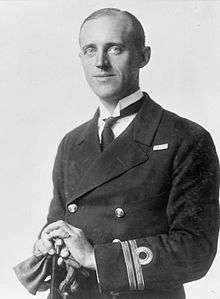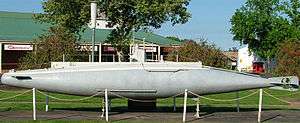Norman Douglas Holbrook
| Norman Douglas Holbrook | |
|---|---|
 | |
| Born |
9 July 1888 Southsea, Hampshire, England |
| Died |
3 July 1976 (aged 87) Midhurst, Sussex, England |
| Buried at | St James Old Churchyard, Stedham, West Sussex |
| Allegiance |
|
| Service/branch |
|
| Rank | Commander |
| Commands held | HMS B11 |
| Battles/wars |
World War I World War II |
| Awards |
Victoria Cross Légion d'honneur (France) |
Commander Norman Douglas Holbrook VC (9 July 1888 – 3 July 1976) was a British naval recipient of the Victoria Cross (VC), the highest award of the British honours system. Holbrook was the first submariner to be awarded the VC and it was the first naval VC gazetted in the First World War.[1]
Early life
Holbrook was born 9 July 1888 in Southsea, Hampshire. He was educated privately and at Portsmouth Grammar School. In 1903, he enrolled in the officer training establishment Britannia Royal Naval College and was appointed midshipman on 9 January 1905. He joined the submarine depot ship HMS Bonaventure on 4 April 1911, served in submarines HMS F3, HMS V4 and HMS E41 before taking command of HMS B11 on 30 December 1913.[2]
World War I
Holbrook was 26 years old, a lieutenant in the Royal Navy during the First World War when on 13 December 1914 at the Dardanelles, Turkey, he performed a deed for which he was awarded the Victoria Cross. He was in command of the submarine HMS B11, an old and obsolete craft built in 1905. Notwithstanding the difficulties of a treacherous current in the Dardanelles, he dived under five rows of mines and torpedoed and sank the Ottoman ironclad Mesûdiye, which was guarding the mine-field. In spite of being attacked by gunfire and torpedo boats, Holbrook succeeded in bringing the B11 back to the Mediterranean, When they got back to safety the B11 had been submerged for nine hours.[3]
Holbrook later achieved the rank of Commander.
Death and legacy
Holbrook died on 3 July 1976 at Midhurst, Sussex. He was buried at St James Old Churchyard, Stedham, West Sussex. He is probably the only VC recipient to have a town and (until May 2004) a local government area named for him. On 24 August 1915, amid a wave of anti-German feeling related to the First World War, the name of the New South Wales Eastern Riverina town of Germanton was changed to Holbrook to honour the recent VC recipient. He subsequently visited the town on three occasions. His widow, Mrs. Gundula Holbrook, donated his medal to the Council of the Shire of Holbrook in 1982. In 1995 she made a substantial donation towards the establishment of a submariners' memorial in the town, and in 1997 visited the town to unveil it. A bronze statue of Holbrook stands in Germanton Park, Holbrook.

Holbrook's medal was donated to the Council of the Shire of Holbrook, New South Wales in 1982. It subsequently passed to Greater Hume Shire Council upon the amalgamation of several Riverina shires in May 2004. Holbrook’s medal group, including his Victoria Cross, went on display at the Australian War Memorial on 11 December 2009. His medals are on loan from the Greater Hume Shire Council.[4][5] A replica may be seen at the Submarine Museum, Holbrook.
Holbrook Road in Portsmouth is named after him.
See also
References
- ↑ "First Naval V.C. The Exploit Of Submarine B 11". News, from the London Gazette. The Times (40733). London. 23 December 1914. col C, p. 8.(The first naval award for the First World War to Commander Henry Peel Ritchie RN in November 1914 was not gazetted until April 1915.)
- ↑ John Winton. The Victoria Cross at sea, Michael Joseph, 1978, ISBN 0 7181 1701 8.
- ↑ The London Gazette: no. 29015. p. 10920. 22 December 1914. Retrieved 15 May 2015.
- ↑ "Media alert—Holbrook VC Unveiled" (pdf). Australian War Memorial. 9 December 2009.
- ↑ "Media release—Holbrook VC Unveiled" (pdf). Australian War Memorial. 11 December 2009.
- Monuments to Courage (David Harvey, 1999)
- The Register of the Victoria Cross (This England, 1997)
- VCs of the First World War - 1914 (Gerald Gliddon, 1994)
- VCs of the First World War - The Naval VCs (Stephen Snelling, 2002)
- Naval Correspondent (15 December 1914). "British Submarine's Exploit. A Turkish Battleship Torpedoed., B 11 Submerged Nine Hours.". News. The Times (40726). London. col B, p. 8. Includes biographical information.
- "White Flag Treachery. How Commander Holbrook, V.C., Was Wounded.". News. The Times (40950). London. 3 September 1915. col A, p. 8.
- "The Prize Court. Lieut. Holbrook's Exploit In The Dardanelles.". Law. The Times (41228). London. 25 July 1916. col C, p. 4.
- "Commander N. D. Holbrook, VC A celebrated naval exploit". Obituaries. The Times (59747). London. 5 July 1976. col F, p. 14.
- "Commander Norman Holbrook". Obituaries. The Times (59753). London. 12 July 1976. col G, p. 14.
External links
- Holbrook and Submarines - The Connection - online version of booklet published by The Submarine Museum on Holbrook and his act of gallantry. Includes list of crew members and copious other information.
- Submarine Town - Naval Historical Society of Australia page
- Musings on Holbrook (or Germanton) - Internet Family History Association of Australia page
- Location of grave and VC medal (West Sussex)
- Notes on the town and the several memorials with images
- ÇANAKKALE GEÇİLMEZ page(in Turkish) about the action and the battleship sunk in the action (with images)
- Greater Hume Shire Council